Every day over 1500 mostly young people leave Nepal. They go to the Gulf States, to Malaysia, Korea or India for a few years on employment contracts. They are determined and have high expectations – but very few of them have any idea what lies in store for them abroad. Nor do they know how to prepare for the challenge ahead to ensure that their labor migration does not become a nightmare.
Nepal
The construction site is a little ways outside Kathmandu. 22-year-old Armin Kellenberger from the Swiss Canton of Thurgau is amazed as he squeezes his way onto the jam-packed bus: “In my country every plumber has his own car with everything he needs inside. Here you take public transport to the construction site.” His Nepalese counterpart Bhu Bikram Angdembe (26) has simply thrown all his tools into a rucksack. Got everything – off we go! Cheerful Nepalese pop music blares from the loudspeakers on the bus during the ride.
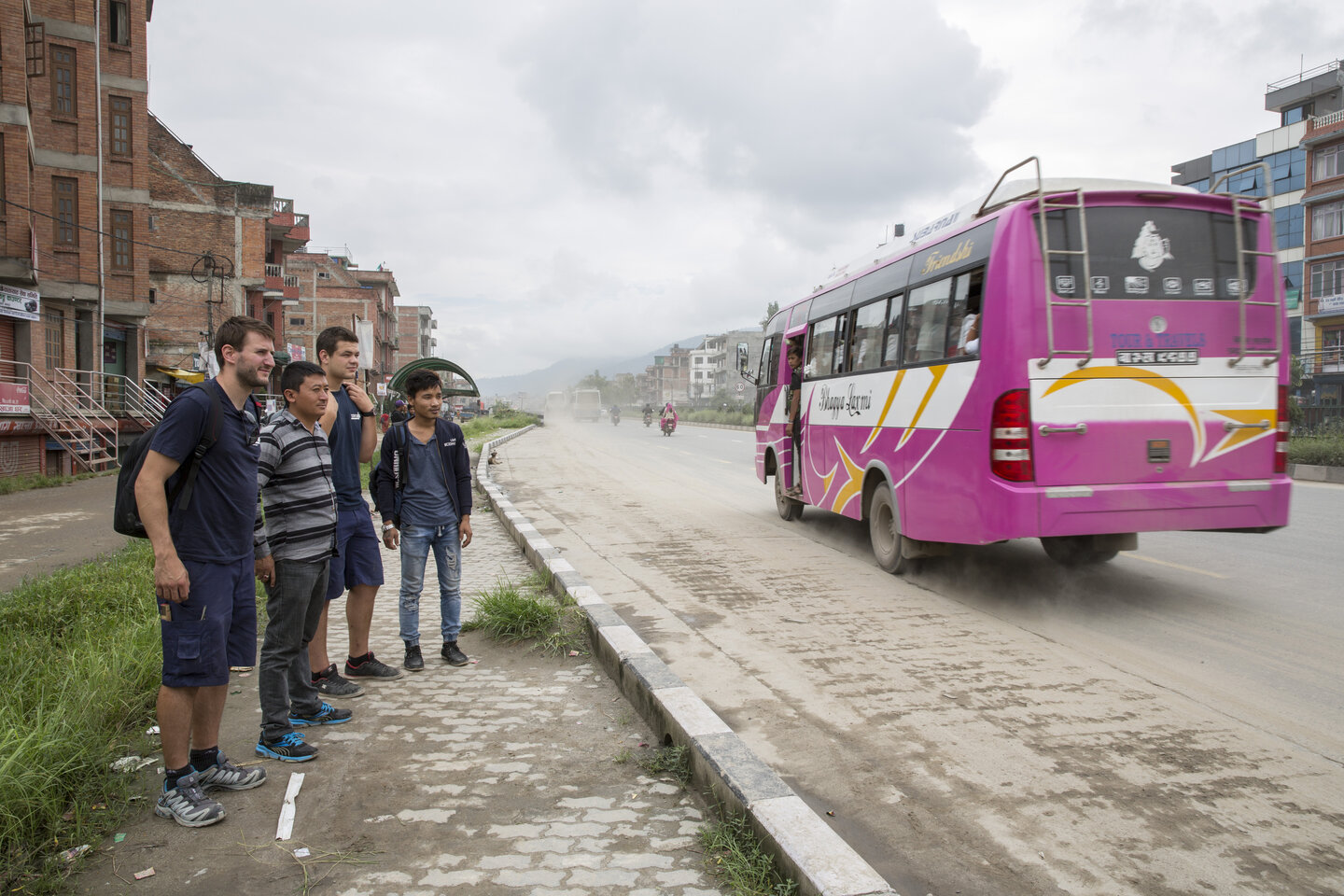
Twenty minutes later the bus stops in the neighboring city of Bhaktapur. A whole middle-class neighborhood is being built here on a site where rice used to be grown. Flexibility is a must on the construction site: it’s never clear till they get there what they’re supposed to do that day. This, too, is new to Armin Kellenberger and Adrian Brühwiler (33), who is Armin’s boss at Brühwiler Sanitär AG back home in the small Swiss town of Oberwangen. Another thing that’s different in Nepal is that the clients supply the materials themselves – and not always in good time.
Under the direction of their host, Padam Sunuwar (29), who has been running a firm called “Plumber's Home” in Kathmandu for a year and a half, the two Swiss guests and their new workmate end up laying pipes to bring fresh water up to a tank on the roof. Since the thermometer seldom dips below zero in the Kathmandu region, the pipes don’t need to be insulated to keep them from freezing. “So it’s very efficient to simply run the pipes along the outer wall,” explains Armin. The pipes then lead from the tank back down into the house, to the kitchen, bathroom and toilets. They are welded together by heating them up.
Adrian Brühwiler, Swiss sanitary plumber
In addition to working together, the Swiss plumbers are lodged with their Nepalese counterparts. They are staying with Padam, who lives with his wife Ganga and seven-year-old daughter Una in a two-room apartment. The Swiss get to use the bedroom, with two beds. The family sleep in the other room, a corner of which is used for cooking.
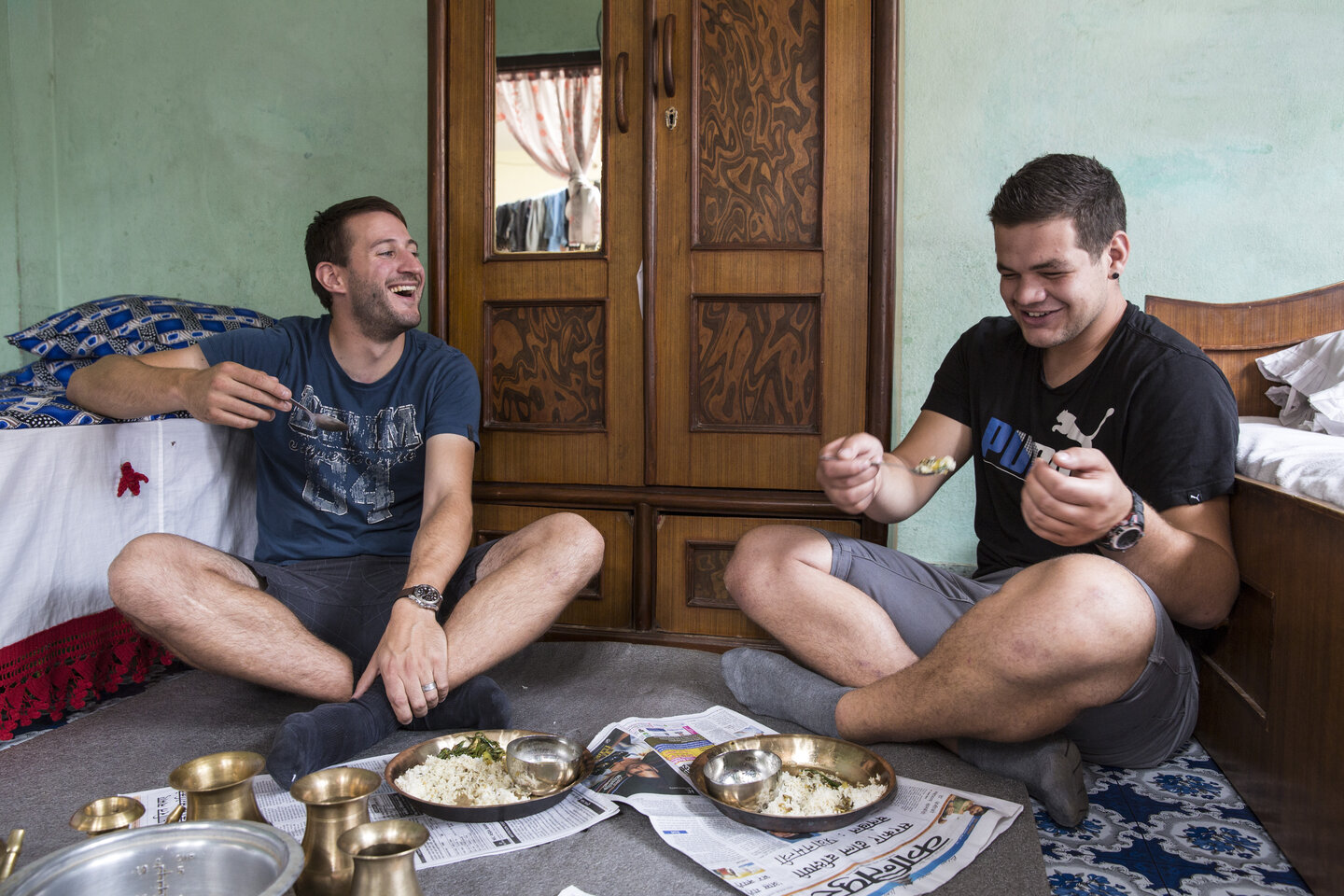
For breakfast, traditionally served around 9am, as for dinner, they are served dal bhat, lentil soup with rice and vegetable curry. The guests are served first, in their room. The family eat afterwards in the other room. Adrian and Armin will have to get used to the rules of hospitality in Nepal.
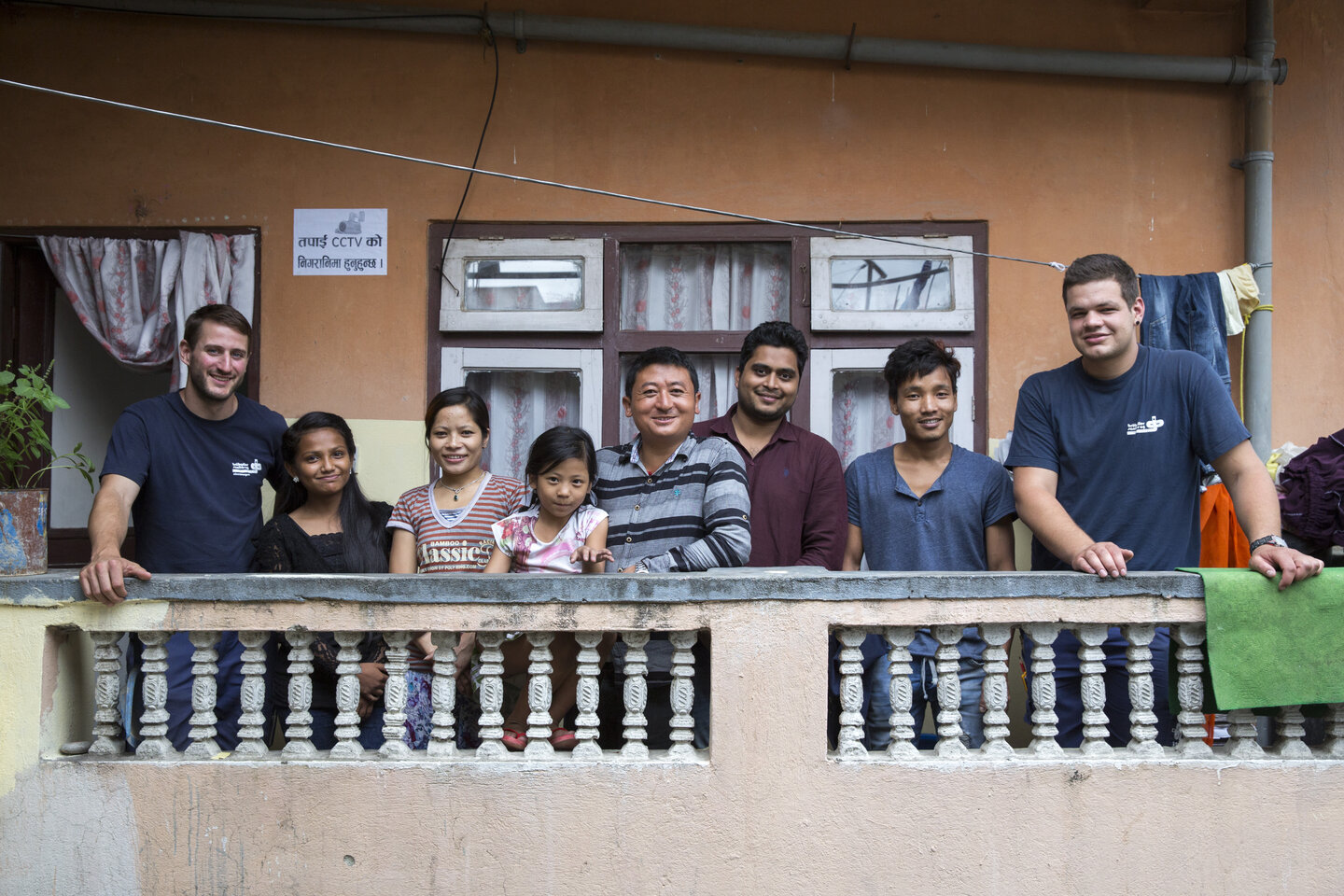
Bhu Bikram lives downstairs in the same house as his sister. He came to Kathmandu to find work. For six months he’s been learning the rudiments of the plumber’s trade from Padam. Padam himself learned his trade in two courses of several weeks’ duration at a vocational training center, which he shows his Swiss mates at the end of their stay in Nepal.
The courses offered there were developed by Helvetas together with private and public training providers as part of our Employment Fund program. Co-funded by the Swiss Agency for Development and Cooperation (SDC), this Helvetas program provides practically-oriented vocational training for the poor and disadvantaged. It improves their employment prospects. At 46%, unemployment among young Nepalese is very high. The goal is for the trainees to find work after their training, so the trainers’ pay is contingent on getting real-world results. And the system works: 71% of those who complete a course of training are still employed or successfully self-employed even three years after their training.
The vocational training center is all about hands-on learning: it has fully equipped bathrooms on which the trainees can practice their skills. The approach is pragmatic and adapted to local parameters, as Adrian observes: “The fixtures are, by our standards, outmoded. But given the conditions at the building site, they’re adequate.”
Adrian Brühwiler, Swiss sanitary plumber
Switzerland
A few weeks later in Switzerland. At 7am the men are already bustling at Brühwiler Sanitär AG in Oberwangen. The plumbers are gathered together and Adrian is distributing the day’s assignments. This is Bhu Bikram and Padam’s first day on the job with Armin. This morning they are going to remove an old washstand in an apartment and install a new one together. To Bhu Bikram, the double sink with medicine cabinet still looks quite usable:
Bhu Bikram Angdembe, sanitary plumber in Nepal
After discovering that the drill can remove screws too, Padam gets down to work straightaway. The two Nepalese ask a number of questions about the various tasks. “The sinks are sound-proofed so you can’t hear someone washing their hands all over the house,” observes Bhu Bikram. “That’s pretty clever.” The three of them get the job done quickly.
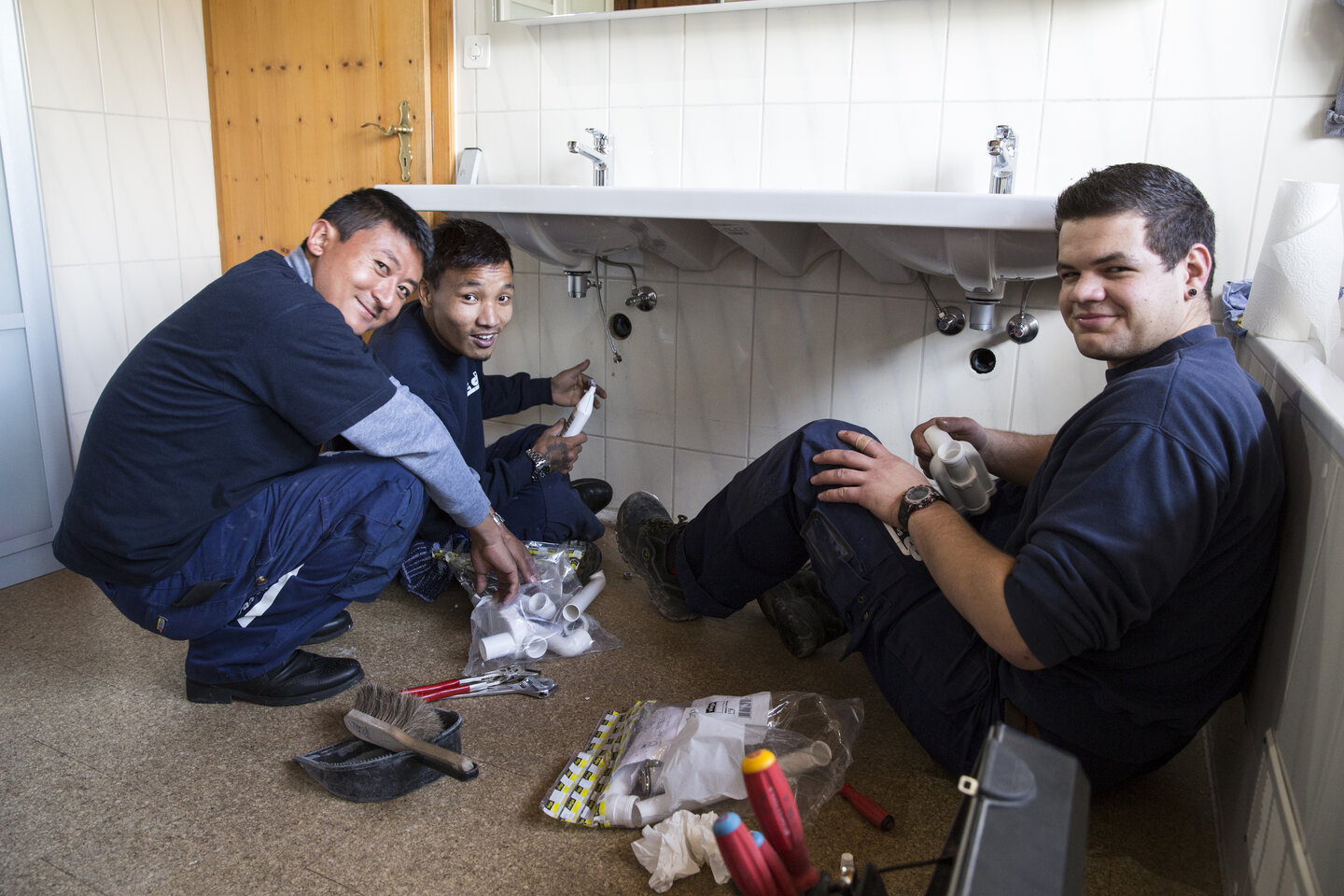
Big snowflakes are falling outside as they emerge from the house. This is the first time Bhu Bikram and Padam have ever seen snow: Kathmandu lies in the subtropical zone, and Bhu Bikram is from the Terai, Nepalese lowlands bordering India, where tropical temperatures predominate.
It’s freezing cold a few days later, too, on the Schwägalp Pass. In addition to an inside look at the Swiss working world, the Nepalese guests also get a chance to see the Alps. Padam looks up skeptically: these thin cables are supposed to carry the car he’s in all the way up to Säntis mountain? But curiosity trumps apprehension, and soon the four plumbers are standing, if not on the roof of the world, at least on the roof of Eastern Switzerland. The blue sky and abundant snow show the host country at its best.
As in Nepal, Adrian shows his guests where he learned his trade: at the "Bildungszentrum für Technik" in Frauenfeld. Training is important, Padam and Bhu Bikram know that too. They try out all sorts of different tools. And the Nepalese are amazed when a young woman shows what she can do with a welding device. Welding is a separate occupation in Nepal – and one that is practiced almost exclusively by members of the lower castes. Padam and Bhu Bikram are surprised to find the skilled trades so highly regarded in Switzerland.
The language is another thing for them to learn. “Gschwind” (“fast”) is the first word that strikes both of them. Other useful expressions they learn are “Ich brauche Arbeit” (“I need work”) and “Ich brauche Essen” (“I need food”). Swiss food tastes good, say the Nepalese. Only all that cheese gives both of them a bit of a stomach ache. So they console themselves with Rivella, a popular Swiss soft drink. Their remarkable week in Switzerland is over gschwind. “I’d like to stay longer,” Bhu Bikram says at the airport, “but my ticket says I have to go back.” Padam now wants to improve the planning of his business: “It makes all the work simpler. I’ve come away with a lot.” Including newfound pride in his occupation. Adrian is glad that the change in perspective went both ways: "So we saw what we have in common. Family cohesion, for example, is very important over here and over there."
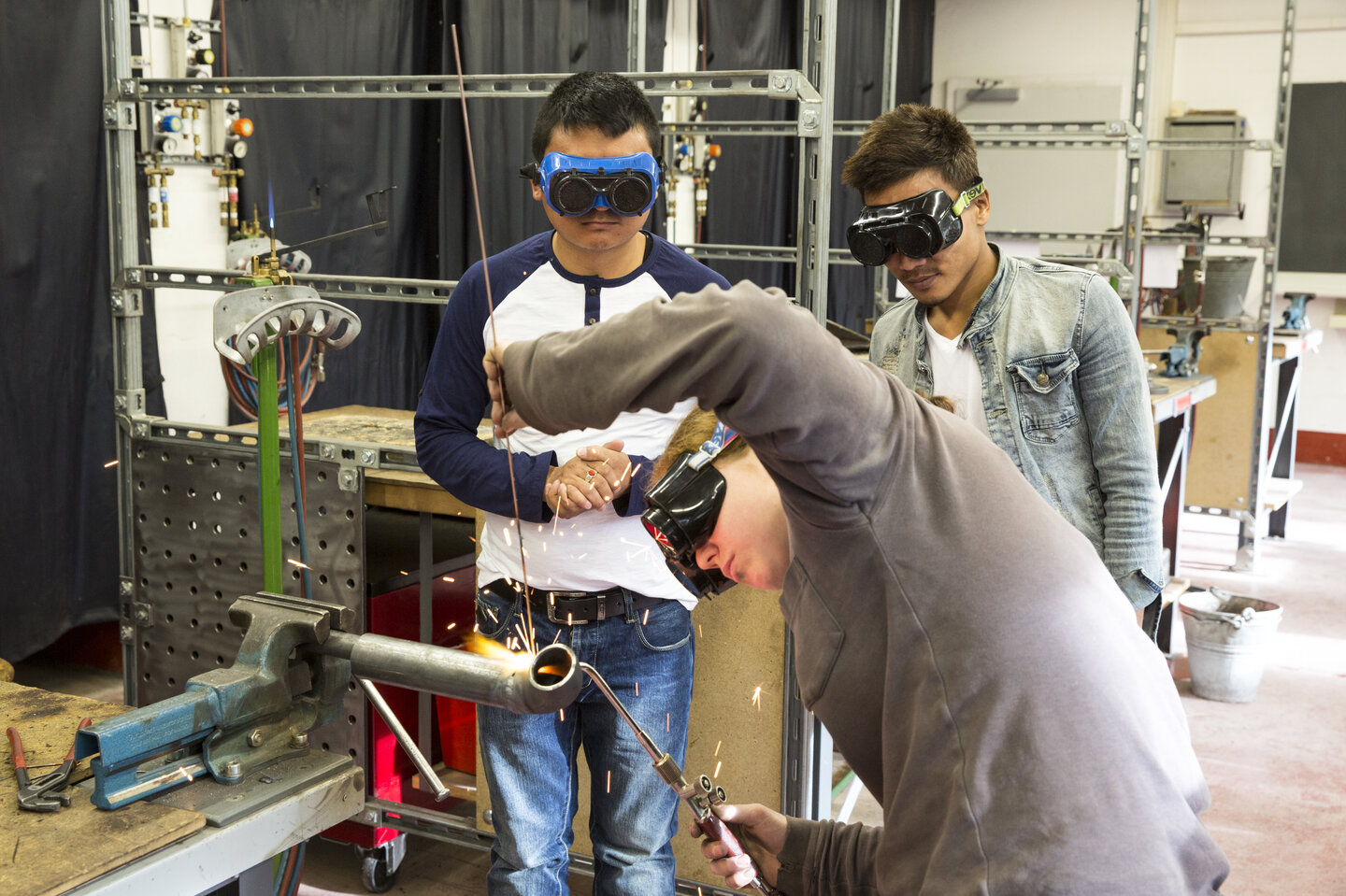
Geberit and Helvetas
Geberit and Helvetas entered into a partnership in 2010 with a view to improving the supply of drinking water and access to sanitary facilities in developing countries. Through its generous support, Geberit has made a crucial contribution to Helvetas’ successful efforts to provide nearly three million people with access to clean water and basic sanitary facilities over the past seven years.
Have a look at the Changing Perspectives project on Geberit’s website.




























